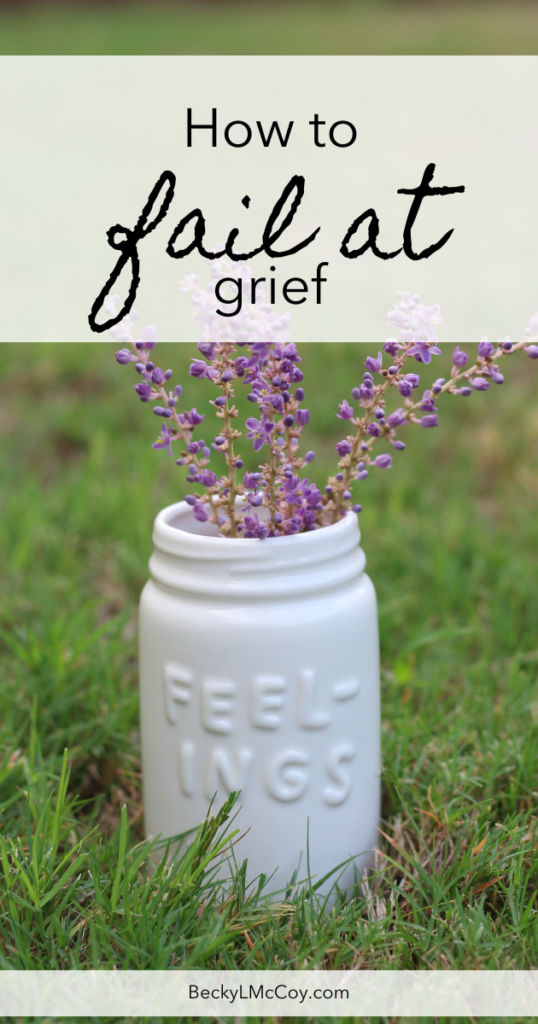How to Fail at Grief

There’s a phrase my family has used often over the years when it comes to healthy grief. We’ve often expressed a desire to “grieve well” — to give our hearts, minds, and bodies adequate time and space to recognize, honor, and process the loss we’ve experienced.
Sometimes that feels like too much pressure. How do I know if I’m doing it right? Am I giving myself enough time to grieve? Too much time? Am I thinking about it enough or am I avoiding letting it affect me? If I do all the “right” things will it make this feeling go away?
Instead of being a very human experience, grief had become a project. Grief was something to get to the end of and crossing the finish line would mean the pain of loss would go away. Run the best race you can and be rewarded with happiness and peace.
The phrase “grieve well” isn’t unhelpful — I think it makes grief something we must actively participate in and maybe it’s exactly what you need right now. And maybe it’s too ambiguous to be helpful (what does “well” even mean?! How do you know you’re doing it?).
The surest way to grieve not-well is to make grief something that can be won or lost, done right or wrong, be good or bad, or be passed or failed. The only way to “fail” at grief is to not grieve at all.
But then how do we grieve? Practically, what does that look like? If you’ve spent time in church, you’ve probably heard the verse that says “We do not grieve like those who have no hope” (1 Thess. 4:13) and were probably taught that meant to be joyful and hopeful while you grieve. Except that ignores the very reality of grief: grief is painful because we have lost someone or something that we loved and we are sad and angry (and all the other emotions that come with them). Hope and joy aren’t grief erasers.
There’s no right way to grieve and no two griefs are the same — I wish I could say I’m becoming a better griever with practice, but I’m finding my way through it every time. Experiencing new grief feels a lot like going to the bathroom in the middle of the night: I know the path from my bed to the toilet, but I have no clue what obstacles await me (legos and matchbox cars are my specific nemesis). Sometimes I remember to use the flashlight on my phone or even turn on a light, but in my still-half-asleep stupor, I’m not usually thinking that clearly. Different paths of grief for different losses may look the same and we may even be able to picture the way through, but we can’t always anticipate the obstacles in front of us.
Yes, I understand it’s not a complete metaphor – I could simply pick up the toys before I turn the lights off at night, but this tired, single mom brain with ADHD often sees right past them until they’re underfoot at 2 am.
When I finally admitted to myself — months after my dad died and I wasn’t doing well — that I actually needed to grieve, I went all in. I figured if I forced myself to grieve I could get it over with and move on. If I felt myself be sad for an allotted time and cried a certain volume of tears I’d be able to check that box and move on.
Excuse me while I go laugh at how ludicrous that is.
Grief can’t (and won’t) be manhandled. You can’t force grief into submission. It won’t obey and it won’t decide to back off just because you gave it some of your attention. Grief will follow you around until you actually face it.
And by face it, I don’t mean fight it and I don’t mean put up with it or give it a set of rules to follow.
My grief looks different all the time. Sometimes good grief is talking about the people I’ve lost or sharing memories. Sometimes it’s making new memories so I don’t get stuck in the old ones. Sometimes it’s saying I feel sad and taking a nap. Sometimes it’s just living minute by minute or hour by hour. Healthy grieving isn’t so much about what you do or don’t do, but the fact that you’re paying attention to when the grief is heavier and lighter and honoring what your heart, mind, and body are asking for. Sometimes you need to be surrounded by people and sometimes you need to cancel all your plans and step away from all your commitments. Sometimes you need to try new things and sometimes you need to revisit old hobbies. Sometimes you need to revisit a familiar place and other times you need to discover a new favorite place. Your needs will always be different, the key is to learn to listen to and identify them.
For a few books to help you feel less alone in your grief, check out BeckyLMcCoy.com/GriefLibrary
Links may be affiliate links, which means when you use them you help support the work I do. Thanks for help keeping the lights on!
Get more encouragement like this straight to your inbox. Sign up below.
